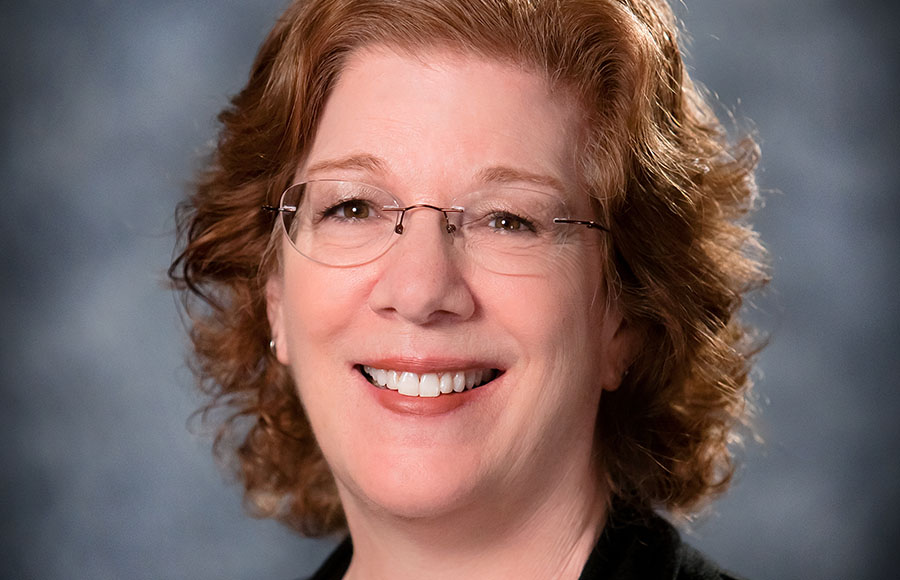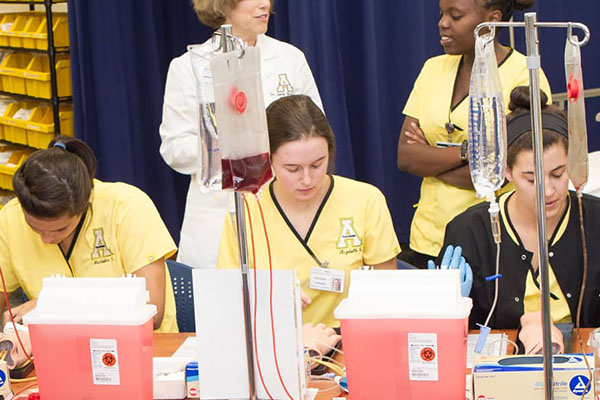
Appalachian alumna Robyn Seamon ’11 ’18, who holds a B.S. in nursing and an M.S. in Appalachian studies from Appalachian. She owns Appalachian Healthcare Training and Consulting, through which she provides cultural sensitivity training to health care providers in the Southern Appalachian region. Photo submitted
BOONE, N.C. — When Robyn Seamon ’11 ’18 enrolled at Appalachian State University to pursue a B.S. in nursing (RN–BSN) degree after years of working as a registered nurse, it was one of her general education courses that made the biggest impact on her life.
“I signed up for an intro course in Appalachian studies, just because I thought it’d be interesting,” Seamon shared. “My husband and I had lived in Valle Crucis for a few years, and we love the mountain culture and mountain music.”
“Little did I know this course would fill me with such passion and purpose,” she added.
A class discussion on health care in Appalachia opened her eyes to the tremendous needs in the region. Seamon said, “There was a story in one of our books about a physical therapist, new to Appalachia, who told her patient it was time for her exercises. The patient replied, ‘I don’t care to.’ The therapist was taken aback but respected the patient’s wishes and left.”
“The therapist tried the same approach for the next two days, with the same response from the patient,” Seamon continued. “Finally, the therapist marked on the chart that the patient was uncooperative and discharged the patient from therapy.”
In a conversation with a more experienced therapist a few weeks later, Seamon said the therapist learned “I don’t care to” is a native Southern Appalachian expression meaning “Sure, that’s fine.”
“That story was an epiphany for me,” Seamon said.
The road to advocacy
Seamon earned her associate degree in nursing from a community college in 1980 and has since worked in several environments, including hospitals, home health, hospice and a clinic at a homeless shelter.
After earning her bachelor’s degree in nursing from Appalachian in 2011, Seamon returned to pursue a Master of Arts in Appalachian studies. She tailored the program to focus on health care issues.
Seamon is the owner of consulting company Appalachian Healthcare Training and Consulting, through which she provides cultural sensitivity training to health care providers in the Southern Appalachian region.
During her master’s program, Seamon conducted qualitative research to learn how the native Appalachian population experiences the health care system differently than the nonnative population.
“Providing culturally competent care is about learning the culture, history, values and beliefs of a patient in order to understand the person, improve communication and overcome stereotypes,” she said.
Seamon completed an internship at the university’s Beaver College of Health Sciences, where she planned and presented seminar topics on Appalachian culture and health care.
“There is a large disparity of health care in this region,” she said. “Compared to other areas in the U.S., Appalachia has a higher rate of mortality from cancer, higher diabetes rate, chronic obstructive pulmonary disease and so many other chronic conditions. Yet there are fewer providers per capita — the region has 65% fewer specialists than other areas.”
Seamon has recently earned the Certified Transcultural Nurse designation, and her lectures qualify as continuing education required for practicing nurses by the North Carolina Nurses Association.
“I consider myself an advocate for the native population of Appalachia,” Seamon said. “Facilitating improvement in the high rates of health disparities is my goal.”
What do you think?
Share your feedback on this story.
About the Department of Nursing
The Department of Nursing in Appalachian State University’s Beaver College of Health Sciences provides an evidence-based nursing education in an intellectually stimulating and challenging environment that is designed to prepare the beginning nursing professional with the knowledge and skills to practice in diverse settings in a highly complex health care system. The department offers two accredited Bachelor of Science programs: the nursing pre-licensure program and the online RN to BSN program, designed for current registered nurses seeking the bachelor’s degree. The department also offers a Master of Science in nursing program that prepares registered nurses for leadership roles as educators. Learn more at https://nursing.appstate.edu.
About the Beaver College of Health Sciences
Appalachian State University’s Beaver College of Health Sciences (BCHS), opened in 2010, is transforming the health and quality of life for the communities it serves through interprofessional collaboration and innovation in teaching, scholarship, service and clinical outreach. The college enrolls more than 3,600 students and offers 10 undergraduate degree programs, nine graduate degree programs and four certificates across seven departments: Kinesiology, Nursing, Nutrition and Health Care Management, Public Health, Recreation Management and Physical Education, Rehabilitation Sciences, and Social Work. The college’s academic programs are located in the Holmes Convocation Center on App State’s main campus and the Levine Hall of Health Sciences, a state-of-the-art, 203,000-square-foot facility that is the cornerstone of Boone’s Wellness District. In addition, the college supports the Appalachian Institute for Health and Wellness and has collaborative partnerships with the Wake Forest University School of Medicine’s Physician Assistant Program, UNC Health Appalachian and numerous other health agencies. Learn more at https://healthsciences.appstate.edu.
About Appalachian’s General Education Program
The General Education Program at Appalachian State University empowers students with broad knowledge and transferable skills for responsible global citizenship regardless of their chosen major. The General Education Program provides a rigorous liberal arts education that includes 44 semester hours of courses across the university that explore connections among different areas of study, plus two courses in the student’s chosen major — all of which address the goals of critical and creative thinking; effective communication; making local-to-global connections; and understanding the responsibilities of community membership. Learn more at https://generaleducation.appstate.edu.
About University College
Formed in 2007, University College consists of the university’s general education program, faculty and student support, and co-curricular programming and support – all designed to support the work of students both inside and outside the classroom. All students at Appalachian begin their education in University College and benefit from its programs until they graduate. Learn more at https://universitycollege.appstate.edu.
About the Center for Appalachian Studies
The Center for Appalachian Studies promotes public programs, community collaboration, civic engagement and scholarship on the Appalachian region. The center is committed to building healthy communities and deepening knowledge of Appalachia’s past, present and future through community-based research and engagement. Learn more at https://appcenter.appstate.edu.
About the College of Arts and Sciences
The College of Arts and Sciences (CAS) at Appalachian State University is home to 17 academic departments, two centers and one residential college. These units span the humanities and the social, mathematical and natural sciences. CAS aims to develop a distinctive identity built upon our university's strengths, traditions and locations. The college’s values lie not only in service to the university and local community, but through inspiring, training, educating and sustaining the development of its students as global citizens. More than 6,800 student majors are enrolled in the college. As the college is also largely responsible for implementing App State’s general education curriculum, it is heavily involved in the education of all students at the university, including those pursuing majors in other colleges. Learn more at https://cas.appstate.edu.
About Appalachian State University
As a premier public institution, Appalachian State University prepares students to lead purposeful lives. App State is one of 17 campuses in the University of North Carolina System, with a national reputation for innovative teaching and opening access to a high-quality, cost-effective education. The university enrolls more than 21,000 students, has a low student-to-faculty ratio and offers more than 150 undergraduate and 80 graduate majors at its Boone and Hickory campuses and through App State Online. Learn more at https://www.appstate.edu.













